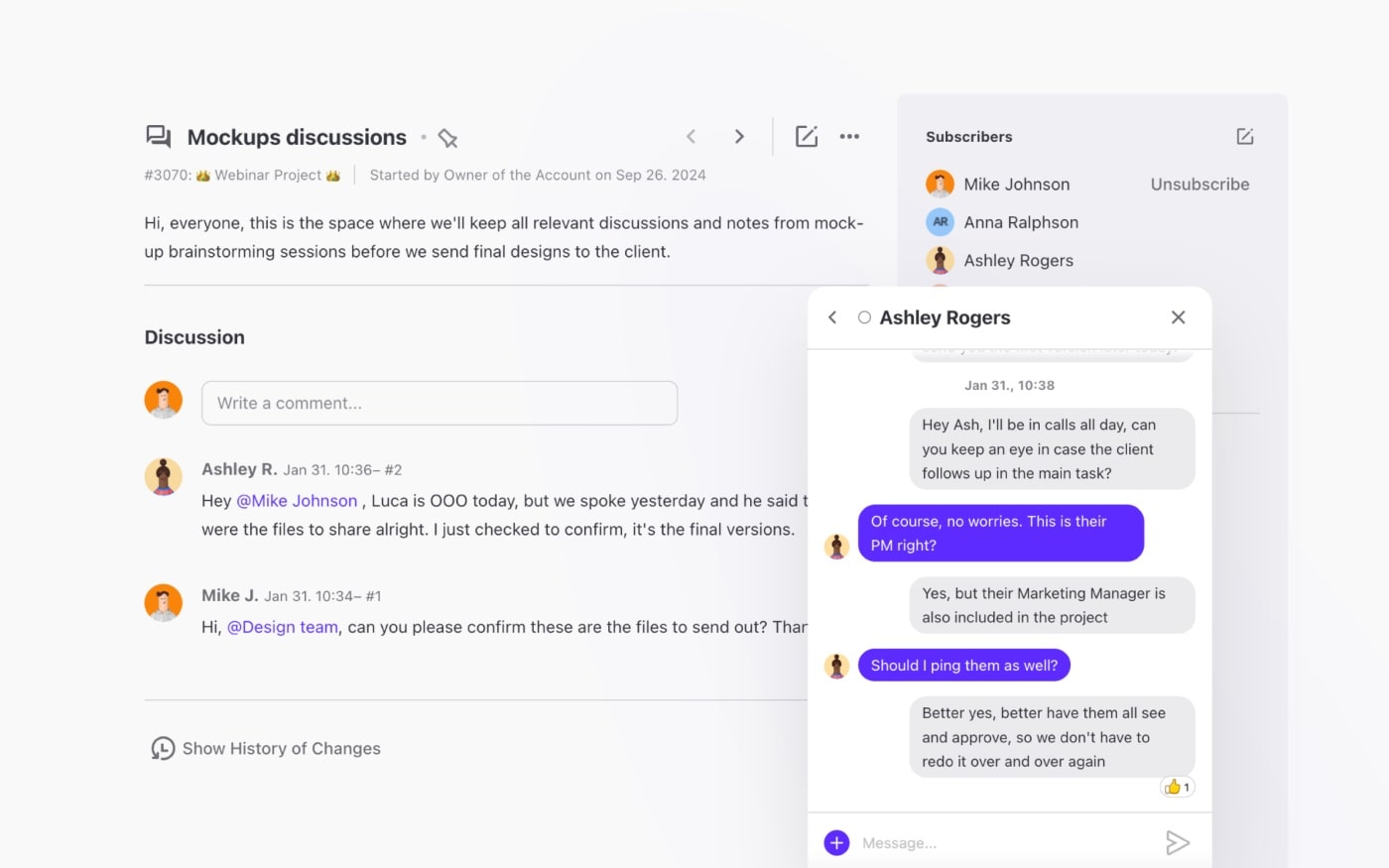Effective teamwork isn't just a feel-good concept. It's a competitive advantage and a proven driver of productivity and engagement.
If you feel like your team is working harder than ever, yet somehow achieving less, the problem may be ineffective teamwork. Organizations that struggle to build and maintain the fundamental characteristics of effective teamwork tend to produce morale-destroying workplaces, where teams feel overwhelmed, overworked, and even burnt out.
But here’s the encouraging news: when teams get the foundations of teamwork right, the results are transformative. By identifying, understanding, and implementing the core characteristics that separate high-performing teams from the rest, you can reach a level of cohesive collaboration that promises a happy workplace and thriving business. Keep reading to find out what the eight essential characteristics of effective teamwork are, which will drive better results for every service business, whether you are a marketing agency, a consultancy, or a software startup.
What Makes Teamwork Truly Effective?
A team's success lives and dies by good teamwork. If your people have the right skills and know how and when to use them, there is almost nothing that will be an impossible feat.
The principle behind effective teamwork is simple: you bring a group of people together with a kaleidoscope of different skills and expertise, they combine them, and deliver absolute magic for the business.
No single person could deliver what a team of diverse, talented people can achieve – especially when they bring out the best in each other. The synergy and positive team spirit that come from effective teamwork create one of the most desired cultural states that workplaces (small and large) can aspire to.
So what are the tell-tale signs of these types of high-performing teams?
- An easy way of working, there's a familiarity, the team just gets each other, and they work like they've been working together for years
- Challenges are overcome quickly, chaos never lasts for long, the team is resilient and creative, they set up an action plan, and bounce right back
- Consistent goal-scoring, the team works like a sports team to reach milestones, KPIs, and deliver on client objectives because they love the win
8 Core Characteristics of Effective Teamwork

Research from organizations like Google and McKinsey has identified the specific traits that distinguish effective teams from struggling ones. These findings show that how teams work together matters more than who is on the team.
1. Psychological safety and trust, to boost participation & belonging
The foundation of any effective team is psychological safety. This core trait instils the confidence teams need to take risks, make mistakes, and express ideas without fear of judgment or retaliation.
Google’s extensive Project Aristotle study found psychological safety to be the single most important factor in team effectiveness.
When teams have psychological safety, there is a mutual trust amongst team members, making them feel comfortable:
- Admitting mistakes and learning from failures
- Asking questions and seeking help
- Challenging existing processes and ideas
- Taking calculated risks without fear of punishment
Leaders can build this environment by modeling vulnerability, celebrating learning from failures, and ensuring that no team member faces negative consequences for speaking up constructively.
2. Shared vision, values & purpose, to achieve perfect alignment
Teams that work well together have a shared goal and share the same values. They get their organization's mission statement and vision – and it's not just a tag line on a website or corridor poster.
Effective teams don't just deliver work; they understand at a deeper level why the work they do matters.
According to McKinsey, companies that focus on establishing a common purpose are way ahead of their competitors. In fact, they're:
- 2.4 times more likely to have a clear direction
- 4.1 times more likely to be considered a healthy org.
When teams get (clearly) what their purpose and shared goals are, they
- Know how to align priorities and make results-driven decisions
- Are experts in time management and resource allocation
- Promote and foster a continuous culture of motivation and engagement
One way effective teams get this kind of clarity and alignment is by using frameworks like SMART goals or OKR's. That way, they can make sure everyone understands not just what the goal is, but why it actually matters.
It also helps to have a teamwork management platform such as ActiveCollab, where you can centralize all your project and client work. Having one platform that lets you create individual and team tasks with detailed descriptions and rationale, set due dates, and assign owners helps you make sure everyone knows what they are doing.

3. Collaboration & structure, to enable problem solving
Successful teams are collaborative teams. The stellar results they achieve don't happen by accident. They happen because they have a clear structure for decision-making, and they bring the right mix of different perspectives that matter.
You won't find effective teams waiting around for instructions to come from the leadership team when they see something is amiss. They speak up, no matter what level of staff they are from, and the leadership team is always ready and willing to hear them out and let them take action.
Open communication, brainstorming, and discussion make the foundations and the core of their work processes. of how they work.
But what does this team set up to deliver for the business?
It delivers a bunch of advantages, including:
- Better results, because decisions are made holistically, not individually
- Accountable individuals, where people take ownership and do what they say they will
- Efficient systems, because there is a unified approach, things get done faster
- Minimal room for conflict, because ideas and issues are addressed quickly and openly
When you make honesty, respect, and openness the norm, people feel they have a voice and that their opinions and expertise are valued. This quickly produces a team that is more invested in their work and the business.
However, to encourage and practice collaboration, you need to make sure you teams have the tools that allow them to interact and connect, whether they are an in-office, hybrid or remote. Team collaboration and communication software can make sure no body is left out and that everyone has a way to pitch-in.
ActiveCollab lets all types of teams work together in one tool. With real-time collaboration channels such as task comments (@metions), file sharing, discussions, and in-app messaging, teams can brainstorm, resolve blockers, and collaborate on projects asynchronously or live.

4. Defined roles & achievable goals, to drive performance
Two of the most vital elements of effective teamwork are clearly defined roles and achievable goals.
If each person in the team doesn't know what sits in their remit and what they are responsible for, how will they deliver and be accountable?
And if you set goals that are above their realistic capabilities or market conditions, what will make them want to work at it, when they know they're playing a game they're bound to lose?
So, remove confusion by making sure everyone is super clear on what their role is, exactly and what's expected of them. And then connect those responsibilities to well-defined, realistic goals they'll feel inspired to achieve.
And don't be scared to make those goals modest. Sometimes, modest goals are the best goals because they get the momentum going before they aspire to bigger, better things.
Effective role definition includes:
- Specific accountability for deliverables and outcomes
- Clear decision-making authority at appropriate levels
- Understanding of interdependencies between roles
- Flexibility to adapt roles as projects evolve
Well defined roles and achievable goals are vital to driving team performance because they provide structure, direction and accountability. For service businesses that deal with projects, and have multiple moving parts, requiring cross-functional team input, understanding the roles and responsibilities of a project manager is crucial, and all-in-one project management tools like ActiveCollab are vital.
Letting you assign task ownership, set time estimates and track time logs for various client projects allows account and project managers to monitor and manage project profitability and optimize resource allocations.
With task dependancy features, you can make sure everyone knows exactly which tasks are connected and rely on one another for successful completion.

5. Open & honest communication, to support transparency
If you've ever been part of a team that lives and breathes open communication, you know how inspiring, freeing, and thought-provoking this kind of environment can be.
These types of workplaces have the perfect combination of casualness and professionalism that make difficult periods and long days feel less stressful and draining.
They talk openly and honestly about everything. They know each other's personal struggles and work dramas, they offer support to one another, and give and take advice when needed. But they're also not afraid to provide some constructive feedback when they feel they've been wronged.
But where do you start if you want to bring this kind of open and transparent setup in your workplace?
You start with the basics, which include:
- Regularly check-ins to make sure everyone can air their concerns and worries often
- Active listening, to really hear and understand people when they talk and give feedback
- Information sharing, so everyone stays on the same page
- Welcoming feedback, encourage an all-feedback welcome culture where the good and the not-so-good are shared equally
The more you practice these principles, the more natural it will be for your team to let down their guard and feel free to speak up. This is crucial if you want to bring out the best in your team and develop more resilient people. People who can take constructive criticism in their stride and see it as an opportunity for team alignment and growth.

6. Mutual support and accountability, to fuel motivation
When you take all of the above and add mutual support, you take your workplace to a whole other level of team consciousness. One where the entire team thrives because they know their colleague will step in and help when they're struggling, and they'll do the same in return.
Everyone may have their own set of accountability, but their shared purpose encourages them to share the load when needed. And happens then? Everyone's motivation and sense of camaraderie spike because they feel supported. And that sets the motivation wheel in motion.
So what does this look like in an average team? It looks like:
- Team members helping one another get through tough moments
- Everyone sharing their expertise and know-how, unselfishly
- Keeping one another accountable and on track with goals
- Taking moments to celebrate individual wins as well as team achievements
The most difficult part here is getting the balance right between support and accountability. You want to create a workplace where high performance is not only expected but also enabled.
7. Diversity & inclusion, to drive innovation
The most effective teams bring together diverse perspectives, skills, and experiences. But diversity alone isn’t enough. Teams must also create inclusive environments where all voices are heard and valued, and that's where the psychological safety and trust we mentioned earlier come into the mix.
The benefits of this approach are confirmed by a McKinsey report, which states that companies with more culturally diverse executive teams were 33% more likely to outperform their peers on profitability.
A diverse team is your gold ticket for big wins.
But what does it take?
It takes a couple of things:
- Addressing problems by looking at them from different angles to understand the big picture
- Being a brainstorming and idea-generation machine that welcomes innovative solutions
- Letting decisions be made by more people because of a holistic approach covers more ground
- Constant connection and engagement so you always unite and deliver
"Diversity and inclusion" is a phrase that's been drilled into leaders, and it's by accident. It's because it truly makes a difference when it comes to delivering the kind of results businesses and clients depend on.
8. Adaptability and continuous learning, to promote growth
Adaptable and growth mindset teams are the only types of teams that can survive today's business environments. No matter what industry you're in, change-ready and enthusiastic individuals who have the ability to navigate and succeed in unfamiliar territory are indispensable.
This is because teams with this kind of attitude are better positioned to capitalize on emerging opportunities and bring growth to the business.
Adaptable, learning-oriented teams demonstrate:
- Willingness to experiment with new approaches
- Quick recovery from setbacks and failures
- Regular reflection on what’s working and what isn’t
- Proactive skill development and knowledge sharing
The most adaptable teams invest in cross-training and knowledge sharing that builds both depth and breadth of capabilities across the group.
Building these characteristics in your organization
Understanding these characteristics is the first step, but implementation requires deliberate effort and consistent practice.
Here are practical strategies for developing each characteristic:
Start with you (the leader): Lead the way by example. Be the leader who's vulnerable and honest. Take responsibility and show your team what accountability looks like in practice.
Create a framework: Get the operational stuff in order. Set up the processes that make role clarification, feedback, and team collaboration possible, easy, and efficient. If you make the technical aspect of this stuff hard, effective teamwork will be impossible.
Give them the tools: Tools and training are what make the operational stuff roll smoothly, so give your people what they need (in the technical sense) to succeed.
Tracking progress: Find a reliable way to measure progress, whether it's using numbers (like how much work got done) or qualitative feedback (like through team surveys) to understand how far you've come and what needs work.
Overcoming common obstacles

Even the best of teams come up against difficult times and obstacles from time to time. How you pull yourselves out of these scenarios is a direct reflection of the stability and resiliency of your team.
Here are some of the most common obstacles teams face:
Bad communication habits: Silos are usually one of the biggest issues when it comes to communication. Do your best to break these cycles and find ways to have more people make connections by using the concept of working groups on tasks. Get people who don't usually work together to work on a mini project.
Lack of trust: Team-building activities are one of the best ways to promote trust in the workplace. Getting people out of the normal work environment and throwing them into a room where they have to think creatively and collectively can be a game-changer.
Unclear expectations: This can be one of the most frustrating work issues for individuals and teams. Give clear instructions, explain their role in the big scheme of things, and set clear targets. Check in regularly, and make sure everyone knows what they're supposed to deliver.
Resistance to change: Most people resist things they haven't tried, so bring the concept closer so they feel less threatened. Show them the benefits of doing things differently, and involve them in the process, so they feel they are a part of it, and not just an outsider.
Conclusion – The Competitive Advantage of Effective Teamwork
Service businesses simply thrive in a positive and trusting workplace where collaboration and communication are effortless and transparent. This lets you respond faster to market changes, innovate more effectively, and maintain higher employee and client satisfaction and retention rates.
And that's exactly what ActiveCollab does. As an all-in-one service business platform, it lets you centralize, plan, organize and manage client projects as well as your team form one intuitive workspace.
Account and project managers can quickly create entire client projects, tasks, set due dates, and task dependencies, and allocate work to the right owners in minutes. For everything you create, you can invite team members and clients to collaborate with via task mentions, discussions, and in-app messages.
With built-in time tracking and project timeline view options, everyone will know who is doing what, when and why because your entire workflow is connected and integrated. So there will be no more silos, missed messages or unclear assignments.
Want to eliminate endless email chains and clunky systems that slow your agency down because of ineffective teamwork?
Sign up to ActiveCollab's 14-day free trial or book a demo with one of our people to see that teamwork doesn't have to be difficult.
